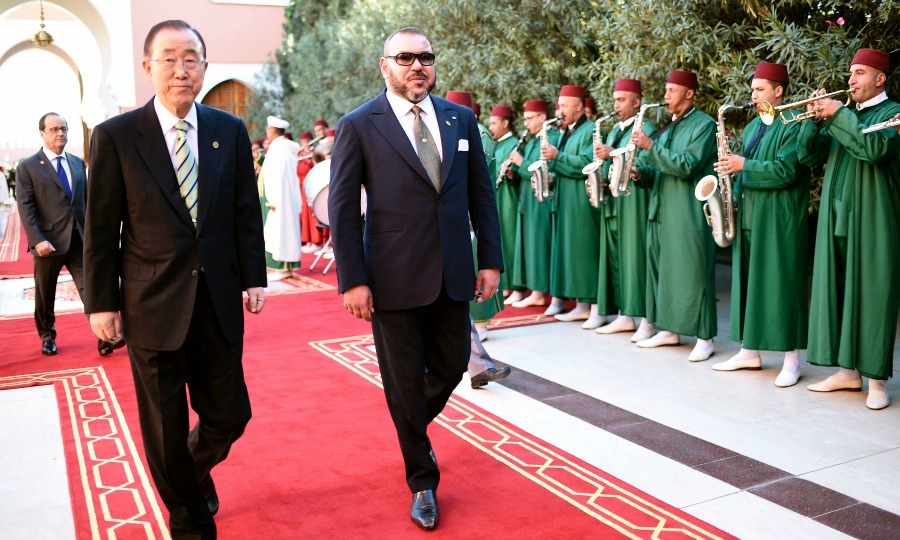
Ban Ki-Moon and King Mohammed VI, November 15, 2016 (Source: Hello! Daily News)

MOROCCO
 Our Concerns
Our Concerns
- Absence of effective cooperation with UN Treaty Bodies and Special Procedures in individual cases of human rights violations;
- Violations of the right to freedom of expression and peaceful assembly, including reprisals against journalists and human rights defenders, and the excessive use of force and mass arrests to disperse peaceful gatherings;
- Persistent practices of arbitrary detention, torture and ill-treatment.
 Upcoming
Upcoming
- 2018: Visit of the UN Special Rapporteur on the independence of judges and lawyers.
In 2017, the foreign policy of Morocco was marked by its historical reintegration in the African Union after 33 years of absence due to disagreement over the status of Western Sahara, while at the domestic level, the political situation reached a deadlock. The victory of the outgoing Justice and Development Party (PJD) at the October 2016 parliamentary elections was followed by an unprecedented six-month long political crisis, during which the country had no government. The impasse was mainly due to PJD Prime Minister Abdelilah Benkirane being unable to reach an agreement with other political parties and to form a coalition government. This led to Benkirane’s dismissal on March 16, 2017 by the king, who appointed the former Minister of Foreign Affairs, Saad Eddine El Othmani, as the new prime minister. El Othmani formed a new government composed of members of the PJD as well as five other political parties on April 5, 2017. The crisis was described by local and international analysts as a struggle between the PJD – as the most popular political party – and the monarchy, which proved itself to be the effective decision making power in the country.
Moreover, Morocco was shaken by several waves of protests in different parts of the country, which were violently repressed and followed by mass arrests. From the Al Hoceima protests in the northern Rif region to the February 20 Movement gatherings in the capital, over the course of 2017, thousands of protesters called for the end of corruption and for socio-economic reforms. These protests – as well as the violent response from the authorities – illustrate a regression in the human rights situation in the country.

Persistence of the practice of arbitrary detention and absence of torture prevention
The practices of arbitrary detention and ill-treatment remain persistent in the country. Numerous individuals remain arbitrarily detained, despite Opinions issued by the UN Working Group on Arbitrary Detention (WGAD) requesting their release, particularly in counter-terrorism cases. Ahead of the visit of the Sub-Committee for the Prevention of Torture (SPT) to Morocco in October 2017, Alkarama submitted a briefing note to the SPT expressing concern over the fact that the prison administration – including doctors in charge of examining detainees – was under the authority of the king and not of the Ministry of Justice. Moreover, Alkarama highlighted the lack of independence of the judiciary, resulting in the absence of investigations into torture allegations and the admissibility of coerced confessions as evidence before courts. Lastly, Alkarama denounced the lack of independence of complaint mechanisms in places of detention, which hinders the right to effective remedy of torture victims and leads to reprisals against those who submit complaints by the prison authorities.
During its Universal Periodic Review (UPR) held on May 2, 2017, several UN Member States expressed concern over these two issues, and issued recommendations to the Moroccan authorities to take the necessary measures to ensure the full respect for human rights in the framework of counter-terrorism, in particular the right to defence. States also recommended that the Moroccan authorities establish independent and effective mechanisms to prevent the occurrence of torture and ill-treatment, and to ensure such acts are investigated and their perpetrators prosecuted.
On September 21, 2017, during the 36th session of the Human Rights Council, the outcome of Morocco’s UPR was adopted; the authorities announced that they had accepted 191 out of 244 recommendations, while 44 were fully or partially rejected. The delegation also announced the forthcoming adoption of a law extending the powers of the National Human Rights Council (CNDH) and endowing it with the prerogatives of the National Preventive Mechanism in line with Optional Protocol to the Convention against Torture. However, Alkarama remains concerned over the lack of effective autonomy and independence of the CNDH, particularly in politically sensitive cases related to the fight against terrorism or matters of state security. The delegation further stressed the importance of the role of the judicial authorities in ensuring respect for fundamental rights and combating torture, without specifying the measures taken to that end.

Infringements to freedoms of expression, association and peaceful assembly
Violations of the rights to freedom of expression, association and peaceful assembly take various forms, including arbitrary arrests and detention, torture and ill-treatment, and violent dispersals of protests. Victims of this repression include journalists and human rights defenders as well as any citizen expressing criticism of the authorities.
“Violations of the rights to freedom of expression, association and peaceful assembly take various forms, including arbitrary arrests and detention, torture and ill-treatment and violent dispersals of protests.”
On June 16, 2017, following Alkarama’s submission of a complaint to the WGAD on behalf of Sahraouian journalist Salaheddine Bassir, the UN experts issued an Opinion on his case in November 2016. Bassir was arrested in May 2013 for his coverage of a demonstration in Laayoune in favour of the independence of Western Sahara. He was then subjected to torture and ill-treatment to coerce him into confessing that he participated in violent acts against the security forces. On the basis of these self-incriminating statements, he was sentenced on November 24, 2015, to four years in prison for “conspiracy, violence against police officers in service and degradation of public property” following a flawed trial. In their Opinion, the WGAD concluded that his detention was arbitrary due to the fact that he was arrested solely for having covered the demonstrations and sentenced on the basis of coerced confessions during an unfair trial. Despite the WGAD’s call to release Salaheddine Bassir immediately and to grant him adequate reparation, he is still detained by the authorities.
While Bassir’s case illustrates the reprisals journalists may be subjected to for having covered sensitive political issues, such reprisals also extend to human rights defenders, political activists and peaceful demonstrators. During the May 2017 UPR, several UN Member States recommended that Morocco fully ensure the rights to freedom of expression, information, peaceful assembly and association, and that it create a safe environment for human rights defenders and civil society to carry out their activities. However, during the review, the Moroccan authorities rejected recommendations inviting them to put an end to the “prosecution of journalists” and “other individuals detained solely for exercising their rights to freedom of expression, association and peaceful assembly”.
The authorities’ lack of willingness to address these issues was apparent in their response to the social unrest in the village of Al Hoceima in the Rif region. The Al Hoceima protests began in late October 2016 after a fisherman was crushed to death by a garbage truck as he attempted to recover the fish which had just been confiscated and thrown away by the police. As a result, waves of protests erupted in the city and continued for most of 2017, as part of a social movement widely known as the Hirak. Protests were met with a violent crackdown and the mass arrest of protesters. Furthermore, on July 20, 2017, a ban on protests was issued by the authorities. While the king pardoned a total of 1,178 detainees on July 29 – among which a large number were arrested as part of the crackdown on the Al Hoceima protests – activist Nasser Zefzafi, who led the protests and publicly denounced corruption and inequality, remains arbitrarily detained. His trial, along with other activists from the Hirak movement, began on July 10, 2017, with charges including “undermining the internal security of the state”.
Such accusations, along with charges such as “insulting the King” or “undermining the territorial integrity”, are commonly used against journalists and activists to prosecute acts falling under their right to freedom of expression and peaceful assembly, particularly in cases considered as politically sensitive, i.e. cases involving Islamist movements, separatist claims or criticism against the monarchy.

Reprisals and lack of cooperation with the UN human rights mechanisms: the case of Abdul Rahman Alhaj Ali
In 2017, Alkarama brought the case of Abdul Rahman Alhaj Ali – a Syrian citizen and refugee who has been detained in Morocco since October 30, 2014 following an extradition request by Saudi Arabia – to the attention of several UN human rights protection mechanisms.
Alhaj Ali used to work in Saudi Arabia and was wanted by the Saudi authorities for a commercial disagreement with his former kafil – a sponsor necessary for every foreigner to work in the country. The Moroccan authorities accepted the extradition request despite the fact that he was at risk of being subjected to torture and corporal punishment in Saudi Arabia.
Following the submission of his case by Alkarama, the UN Committee against Torture (CAT) requested in a binding decision that the Moroccan authorities not extradite Alhaj Ali to Saudi Arabia.
Since the issuance of the decision by the Committee, Alhaj Ali has been subjected to reprisals and further psychological torture by the judicial and penitentiary authorities, which, since early 2017, have been pressuring him to sign a declaration stating that he willingly accepts to be extradited to Saudi Arabia. The judicial and penitentiary authorities have told him that because of his complaint before the UN Committee against Torture, the Moroccan authorities would never release him. The use of this threat of indefinite detention in particularly harsh conditions led the CAT Special Rapporteurs on Reprisals and Follow-up to Decisions to send a letter to the Moroccan government on March 10, 2017. However, the Moroccan government failed to provide the Committee with sufficient information on the reasons behind the non-implementation of the decision nor the measures taken to remedy his situation.
As a result, and in light of the gravity of Alhaj Ali’s situation, his case was included in the annual report of the UN Secretary-General on the subject of reprisals against persons who cooperated with the UN. Today, as the Committee’s decision has yet to be implemented, Alhaj Ali remains arbitrarily deprived of his liberty and subjected to continuous psychological torture.